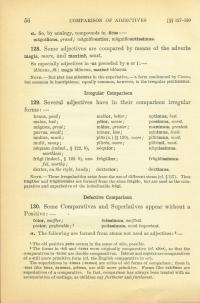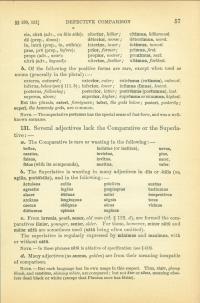129. Several adjectives have in their comparison irregular forms.
| bonus good | melior better | optimus best |
| malus bad | pêior worse | pessimus worst |
| māgnus great | mâior greater | maximus greatest |
| parvus small | minor less | minimus least |
| multus much |
plūs (n.) more |
plūrimus most |
| multī many | plūrēs more | plūrimī most |
|
nēquam worthless |
nēquior | nēquissimus |
|
frūgī useful, worthy |
frūgālior | frūgālissimu |
| dexter on the right, handy | dexterior | dextimus |
Note— These irregularities arise from the use of different stems (cf. § 127). Thus frūgālior and frūgālissimus are formed from the stem frūgāli-, but are used as the comparative and superlative of the indeclinable frūgī.
130. Some Comparatives and Superlatives appear without a Positive.
| ōcior swifter | ōcissimus swiftest |
| potior preferable1 | potissimus most important. |
a. The following are formed from stems not used as adjectives. 2
| cis, citrā on this side (adv.) |
citerior hither | citimus hithermost |
| dē down (prep.) |
dēterior worse | dēterrimus worst |
| in, intrā in, within (prep.) |
interior inner | intimus inmost |
| prae, prō before (prep.) |
prior former | prīmus first |
| prope near (adv.) |
propior nearer | proximus next |
| ultrā beyond (adv.) |
ulterior farther | ultimus farthest |
b. Of the following the positive forms are rare, except when used as nouns (generally in the plural).
| exterus outward | exterior outer | extrēmus (extimus) outmost |
| īnferus below (see § 111.b) |
īnferior lower | īnfimus (īmus) lowest |
| posterus following | posterior latter | postrēmus (postumus) last |
| superus above | superior higher | suprēmus or summus highest |
But the plurals, exterī (foreigners), īnferī (the gods below) posterī (posterity), superī (the heavenly gods), are common.
Note— The superlative postumus has the special sense of last-born, and was a well known surname.
131. Several adjectives lack the Comparative or the Superlative.
a. The Comparative is rare or wanting in the following.
| bellus | inclutus (or inclitus) | novus |
| caesius | invictus | pius |
| falsus | invītus | sacer |
| fīdus (with its compounds) | meritus | vafer |
b. Many adjectives in -ilis or -bilis lack the superlative—for example, agilis, probābilis, and the following.
| āctuōsus | exīlis | prōclīvis | surdus |
| agrestis | ingēns | propinquus | taciturnus |
| alacer | iēiūnus | satur | tempestīvus |
| arcānus | longinquus | sēgnis | teres |
| caecus | oblīquus | sērus | vīcīnus |
| diūturnus | opīmus | supīnus |
c. From iuvenis (youth) and senex (old man) [cf. § 122.d], are formed the comparatives iūnior (younger) and senior (older). For these, however, minor nātū and mâior nātū are sometimes used (nātū being often omitted). The superlative is regularly expressed by minimus and maximus, with or without nātū.
Note— In these phrases nātū is an Ablative of Specification (see § 418).
d. Many adjectives (such as aureus golden) are incapable of comparison due to their meaning.
Note— But each language has its own usage in this respect. Thus, niger (glossy black) and candidus (shining white) are compared; but not āter or albus, meaning absolute dead black or white (except that Plautus once has ātrio).
Footnotes
2. The forms in -trā and -terus were originally comparative (cf. alter), so that the comparatives in -terior are double comparatives. Īnferus and superus are comparatives of a still more primitive form (cf. the English comparative in -er). The superlatives in -timus (-tumus) are relics of old forms of comparison; those in -mus like īmus, summus, prīmus, are still more primitive. Forms like extrēmus are superlatives of a comparative. In fact, comparison has always been treated with an accumulation of endings, as children say furtherer and furtherest.


